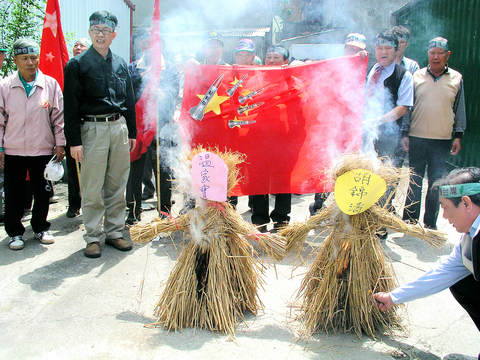Visiting US Secretary of State Condoleezza Rice urged Beijing at a news conference yesterday to take steps to cool tensions that have flared across the Taiwan Strait since the passage of the "Anti-Secession" Law, describing the law as an unwelcome piece of legislation.
Noting that cross-strait issues should be resolved by the two sides in a peaceful manner, Rice said that any unilateral moves that increase tensions are not helpful and that the Anti-Secession Law is not helpful in reducing cross-strait tensions.
Earlier in the day, Rice met with Chinese Foreign Minister Li Zhaoxing (

PHOTO: YANG JIN-CHENG, TAIPEI TIMES
Rice reportedly told Li that the US' "one China" policy and its commitment to the Three Communiques remain unchanged, but the obligations under the Taiwan Relations Act demand that the US make clear to both parties that unilateral moves are not helpful.
Reiterating Washington's concerns over the development of cross-strait relations, Rice stressed that cross-strait differences must be resolved peacefully.
"As for the anti-secession legislation, I said to my Chinese hosts that we would hope that this would be be something that, after having made dialogue across the Straits [sic] more difficult, that they would take steps to reduce tensions now with Taiwan," Rice said.
"The United States is not pleased when either side tries to change the status quo," she said, adding China should make moves to "show goodwill" in its relations with Taiwan.
For his part, Li told Rice that Taiwan remains the biggest challenge in Beijing-Washington relations and whether this issue can be properly handled will directly affect how US-China relations unfold.
"China hopes that the US side will adhere to the `one-China' policy ... and avoid any words or deeds that may aggravate the existing tense cross-straits [sic] situation," Xinhua quoted Li as saying.
Chinese leaders also reiterated their position that the :"Anti-Secession" law was aimed not at war, but at peaceful unification with Taiwan.
The law's passage last week showed "the resolve and sincerity of the Chinese mainland in developing cross-Strait relations and safeguarding peace in the region," Xinhua quoted State Councillor Tang Jiaxuan as saying.
Rice was to leave Beijing late yesterday at the end of her six-nation Asian tour that has also taken her to India, Afghanistan, Pakistan, Japan and South Korea.
Lai Ching-teh (

Conflict with Taiwan could leave China with “massive economic disruption, catastrophic military losses, significant social unrest, and devastating sanctions,” a US think tank said in a report released on Monday. The German Marshall Fund released a report titled If China Attacks Taiwan: The Consequences for China of “Minor Conflict” and “Major War” Scenarios. The report details the “massive” economic, military, social and international costs to China in the event of a minor conflict or major war with Taiwan, estimating that the Chinese People’s Liberation Army (PLA) could sustain losses of more than half of its active-duty ground forces, including 100,000 troops. Understanding Chinese

The Ministry of Foreign Affairs (MOFA) yesterday said it is closely monitoring developments in Venezuela, and would continue to cooperate with democratic allies and work together for regional and global security, stability, and prosperity. The remarks came after the US on Saturday launched a series of airstrikes in Venezuela and kidnapped Venezuelan President Nicolas Maduro, who was later flown to New York along with his wife. The pair face US charges related to drug trafficking and alleged cooperation with gangs designated as terrorist organizations. Maduro has denied the allegations. The ministry said that it is closely monitoring the political and economic situation

UNRELENTING: China attempted cyberattacks on Taiwan’s critical infrastructure 2.63 million times per day last year, up from 1.23 million in 2023, the NSB said China’s cyberarmy has long engaged in cyberattacks against Taiwan’s critical infrastructure, employing diverse and evolving tactics, the National Security Bureau (NSB) said yesterday, adding that cyberattacks on critical energy infrastructure last year increased 10-fold compared with the previous year. The NSB yesterday released a report titled Analysis on China’s Cyber Threats to Taiwan’s Critical Infrastructure in 2025, outlining the number of cyberattacks, major tactics and hacker groups. Taiwan’s national intelligence community identified a large number of cybersecurity incidents last year, the bureau said in a statement. China’s cyberarmy last year launched an average of 2.63 million intrusion attempts per day targeting Taiwan’s critical

‘SLICING METHOD’: In the event of a blockade, the China Coast Guard would intercept Taiwanese ships while its navy would seek to deter foreign intervention China’s military drills around Taiwan this week signaled potential strategies to cut the nation off from energy supplies and foreign military assistance, a US think tank report said. The Chinese People’s Liberation Army (PLA) conducted what it called “Justice Mission 2025” exercises from Monday to Tuesday in five maritime zones and airspace around Taiwan, calling them a warning to “Taiwanese independence” forces. In a report released on Wednesday, the Institute for the Study of War said the exercises effectively simulated blocking shipping routes to major port cities, including Kaohsiung, Keelung and Hualien. Taiwan would be highly vulnerable under such a blockade, because it